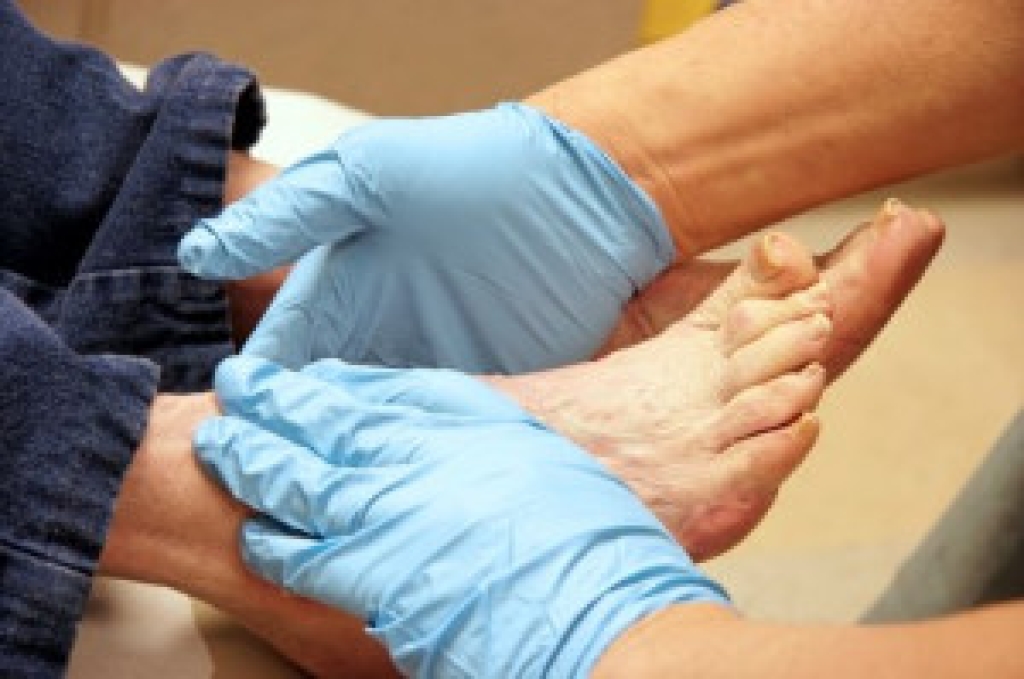Blog
Chronic Conditions and Their Effect on Foot Health

Chronic health conditions often show warning signs in the feet. Diabetes can reduce circulation and sensation, increasing the risk of wounds and infection. Arthritis may cause joint stiffness, deformity, and daily pain that alters walking patterns. Autoimmune disorders can lead to inflammation that affects tendons, ligaments, and soft tissue. Heart and kidney disease may contribute to swelling that stresses skin and joints. Additionally, poor nerve function can change balance and increase fall risk. Diagnosis involves reviewing medical history, symptoms, medications, and lifestyle factors. A podiatrist may examine skin integrity, joint movement, circulation, and nerve response. Imaging or lab testing may be used to clarify underlying causes. When chronic illness begins affecting comfort, mobility, or skin health in the feet, it is suggested that you see a podiatrist for a proper diagnosis and appropriate treatment.
When dealing with systemic disease of the feet, it is extremely important to check the affected areas routinely so that any additional problems are caught quickly. If you have any concerns about your feet and ankles contact Jennifer M. Kern, DPM from South Carolina. Our doctor will assist you with all of your podiatric needs.
Systemic Diseases of the Feet
Systemic diseases affect the whole body, and symptoms usually are displayed in the feet. This condition can make a patient’s ability to walk unbearable. Systemic diseases include gout, diabetes mellitus, neurological disorders, and arthritis.
Gout – is caused by an excess of uric acid in the body. Common symptoms include pain, inflammation, and redness at the metatarsal/phalangeal joint of the base big toe. Gout can be treated by NSAIDs to relieve pain and inflammation, and other drugs that lower the acid levels in the body.
Diabetes mellitus – is an increase in the level of blood sugar that the body cannot counteract with its own insulin. Failure to produce enough insulin is a factor in Diabetes.
Diabetes of the Feet
Diabetic Neuropathy – may lead to damaged nerves and affect the feet through numbness and loss of sensation.
Peripheral Vascular Disease – can restrict the blood flow to the feet, and often times lead to amputation of the feet.
If you have any questions please contact our office located in West Columbia, SC . We offer the newest diagnostic and treatment technologies for all your foot and ankle needs.
Metatarsal Fractures and How They Affect Your Steps

A metatarsal fracture is a break in one of the long bones across the front of the foot, and it can happen from a sudden injury, twisting the foot, or repetitive stress that gradually weakens the bone. Because these bones help support body weight with each step, even a minor fracture can lead to swelling, bruising, sharp discomfort while walking, or difficulty bearing weight. Some fractures appear suddenly, while others develop slowly in active individuals as a dull ache that becomes harder to ignore. Prompt evaluation is important because each fracture pattern requires a specific approach, ranging from rest and supportive footwear to immobilization or more advanced treatment. Delaying care may affect healing and prolong pain. If you have ongoing pain in the forefoot after an injury or repeated activity, it is suggested tat you see a podiatrist for an accurate diagnosis and a treatment plan that encourages safe, steady healing.
Foot Pain
Foot pain can be extremely painful and debilitating. If you have a foot pain, consult with Jennifer M. Kern, DPM from South Carolina. Our doctor will assess your condition and provide you with quality foot and ankle treatment.
Causes
Foot pain is a very broad condition that could be caused by one or more ailments. The most common include:
- Bunions
- Hammertoes
- Plantar Fasciitis
- Bone Spurs
- Corns
- Tarsal Tunnel Syndrome
- Ingrown Toenails
- Arthritis (such as Gout, Rheumatoid, and Osteoarthritis)
- Flat Feet
- Injury (from stress fractures, broken toe, foot, ankle, Achilles tendon ruptures, and sprains)
- And more
Diagnosis
To figure out the cause of foot pain, podiatrists utilize several different methods. This can range from simple visual inspections and sensation tests to X-rays and MRI scans. Prior medical history, family medical history, and any recent physical traumatic events will all be taken into consideration for a proper diagnosis.
Treatment
Treatment depends upon the cause of the foot pain. Whether it is resting, staying off the foot, or having surgery; podiatrists have a number of treatment options available for foot pain.
If you have any questions, please feel free to contact our office located in West Columbia, SC . We offer the newest diagnostic and treatment technologies for all your foot care needs.
Recognizing and Treating Hammertoe

Gradual changes in toe position can be an early sign of a hammertoe, where one or more toes bend at the middle joint and no longer rest flat. Common signs include toe stiffness, irritation from footwear, and corns or calluses. As the hammertoe progresses, the toe may become rigid, limiting movement and causing more pain. Muscle imbalance, nerve conditions, injury, and long-term pressure on the toes can all contribute to this toe deformity. A podiatrist can evaluate toe alignment, joint flexibility, and foot structure to confirm the diagnosis and determine treatment. Some cases of hammertoe may require surgery to correct alignment and relieve pain. If you notice changes to the structure of your toes, it is suggested that you make an appointment with a podiatrist for an exam, diagnosis, and treatment.
Hammertoes can be a painful condition to live with. For more information, contact Jennifer M. Kern, DPM of South Carolina. Our doctor will answer any of your foot- and ankle-related questions.
Hammertoe
Hammertoe is a foot deformity that occurs due to an imbalance in the muscles, tendons, or ligaments that normally hold the toe straight. It can be caused by the type of shoes you wear, your foot structure, trauma, and certain disease processes.
Symptoms
- Painful and/or difficult toe movement
- Swelling
- Joint stiffness
- Calluses/Corns
- Physical deformity
Risk Factors
- Age – The risk of hammertoe increases with age
- Sex – Women are more likely to have hammertoe compared to men
- Toe Length – You are more likely to develop hammertoe if your second toe is longer than your big toe
- Certain Diseases – Arthritis and diabetes may make you more likely to develop hammertoe
Treatment
If you have hammertoe, you should change into a more comfortable shoe that provides enough room for your toes. Exercises such as picking up marbles may strengthen and stretch your toe muscles. Nevertheless, it is important to seek assistance from a podiatrist in order to determine the severity of your hammertoe and see which treatment option will work best for you.
If you have any questions, please feel free to contact our office located in West Columbia, SC . We offer the newest diagnostic and treatment technologies for all your foot care needs.
The Power of Intrinsic Foot Muscles in Support and Movement

The intrinsic muscles of the foot play a vital role in shock absorption, protection of the plantar fascia, and guiding how force transfers from the ground back into the body, which is especially important for runners who place repeated stress on their feet. Keeping these muscles strong helps improve balance, stability, running efficiency, and overall foot health. Helpful exercises include toe crunches by curling your toes while keeping your heel down, calf raises by lifting your heels slowly while standing tall, and toe extensions by lifting your toes upward while the rest of your foot stays flat. These movements strengthen the small muscles that support your arch and reduce strain during long runs or speed work. A podiatrist can assess your running mechanics and create a personalized strengthening plan. If you experience foot pain, scheduling a visit with a podiatrist can help you stay injury-free and improve performance.
Exercising your feet regularly with the proper foot wear is a great way to prevent injuries and build strength. If you have any concerns about your feet, contact Jennifer M. Kern, DPM from South Carolina. Our doctor can provide the care you need to keep you pain-free and on your feet.
Exercise for Your Feet
Exercise for your feet can help you gain strength, mobility and flexibility in your feet. They say that strengthening your feet can be just as rewarding as strengthening another part of the body. Your feet are very important, and we often forget about them in our daily tasks. But it is because of our feet that are we able to get going and do what we need to. For those of us fortunate enough to not have any foot problems, it is an important gesture to take care of them to ensure good health in the long run.
Some foot health exercises can include ankle pumps, tip-toeing, toe rises, lifting off the floor doing reps and sets, and flexing the toes. It is best to speak with Our doctor to determine an appropriate regimen for your needs. Everyone’s needs and bodies are different, and the activities required to maintain strength in the feet vary from individual to individual.
Once you get into a routine of doing regular exercise, you may notice a difference in your feet and how strong they may become.
If you have any questions, please feel free to contact our office located in West Columbia, SC . We offer the newest diagnostic and treatment technologies for all your foot care needs.




